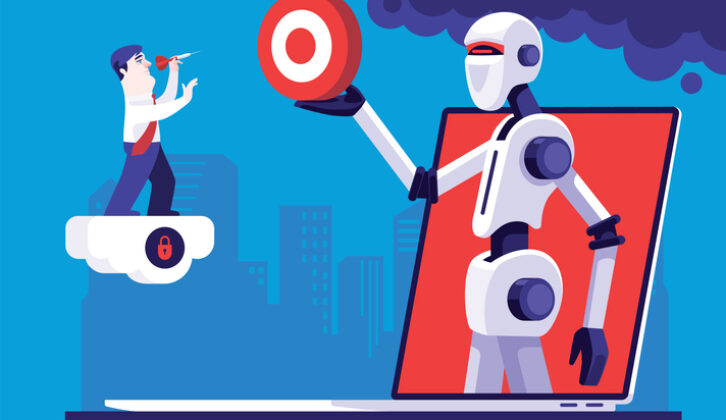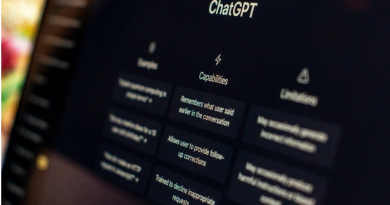Can AI enhance leadership?
Do you remember your introduction to smartphones? Ryan, our techy son-in-law, was the first person I knew with an iPhone. Usually understated, Ryan declared that the iPhone was the first technology he’d seen that would change how he lived his life in small and significant everyday moments. We shook our heads in disbelief — a new version of a phone would change your life?

We’re at the same place in history with artificial intelligence (AI). This time, I won’t be on the sidelines waiting to see if it’s legitimate. When asked if people should worry about AI taking over their jobs, researcher Josh Bersin shared: “Absolutely not. The only people who will lose their jobs to AI are those who ignore it and fail to learn it!”
We’ve seen AI portrayed in futuristic movies, and it’s operated behind the scenes in our favorite apps such as Siri, Amazon Alexa, Bing and Spotify. But suddenly, AI is at our fingertips. I’ve used AI-based writing apps such as Writesonic and Grammarly for years. I find them fascinating. And, as with any radical new technology, it is problematic.
That’s why I jumped at the opportunity to join Chris Wollerman, CEO of Inspire Software, to explore this provocative question:
Can we enhance leadership through technology embedded with artificial intelligence?
The webinar billed me as an “expert.” I am an expert in leadership and motivation science. But technology and AI, not so much. But my motto is, “I teach what I most need to learn.” I thought you might appreciate what I learned as you navigate this new world of AI.
3 leadership dilemmas
- Leaders know what they should do but are too busy. Your primary leadership responsibility is clarifying expectations and developing the people you lead. Still, goal setting and weekly one-on-one meetings to provide direction and support can feel burdensome — especially with a hybrid team.
- Use it or lose it. You attend training sessions to develop your leadership skills. Still, because you don’t integrate what you learn into your everyday flow of work, you either feel guilty for not taking advantage of what you learned or feel like the training was a waste of time — or both.
- Hybrid teams are challenging. Surprising studies revealed that productivity didn’t decline while people worked from home during COVID-19 but increased. Working from home, though, can create other issues, such as isolation and lack of connection with colleagues. What’s a manager to do?
An AI issue
When I prompt an AI app to enhance my writing, I can tell that my approach to motivation is ahead of the curve because AI feeds me information based on traditional and outdated models of motivation. AI pulls from what’s been published in the metaverse. And, what’s out there when it comes to motivation science is unproven hierarchies by Abraham Maslow or refuted theories based on B.F. Skinner’s work with animals who were conditioned by incentives and rewards.
The adage, garbage in — garbage out, is valid for AI. Good science takes 40-60 years to make it into mainstream usage. AI will shrink that timeline, but you still need to be wary of the quality of AI-generated information.
Can technology and AI enhance leadership?
The answer to this question is an emphatic YES but with a big caveat. The slide below is the result of asking an app such as Chat GPT to help you set a SMART OKR (objectives and key results).

The slide below depicts four areas of the AI results that need to be updated. The information must reflect motivation science on what constitutes high-quality goals or effective OKRs.

This slide summarizes what happens when you ask for help to write a goal and then leave it to the metaverse of AI.

Now, imagine you input the same prompt into a platform tailored with AI to reflect the latest in motivation science. This slide is a screenshot of what you’d get from Inspire Software.

You get high-quality results by tailoring AI with the latest motivation research and proven goal-setting methods.

Chris Wollerman explains why his team tailored their AI system, including my approach to motivation:
“Technically, it’s all about the prompt engineering that feeds the AI. The results are only as good as the prompt provided, and most users will not know how to write a prompt to create a high-quality goal or conversation. Inspire Software does the prompt work behind the scenes to integrate your expert guidance.”
Can tailored AI deepen connection?
The goalsetting example above can help solve the first two leadership dilemmas — assisting busy leaders to streamline the time required for setting goals and helping them integrate what they’ve learned about SMART OKRs into their process. And, because all this is automated, working with a hybrid team is less challenging. But what about the third dilemma — the loss of connection people experience while working from home?
I am a proponent of the hybrid work model, where people feel their psychological needs for autonomy, choice and competence are fulfilled by working from home. Coming into the office for two days per week will help fill their need for human connection. But what if AI can also help deepen connection? With tailored AI, you can generate dialogue cues to use in your one-on-one meetings that are proven to deepen connection by aligning people’s work with meaningful values and a sense of purpose or appeal to their personality preferences.
We’re still working to get to the other side of complexity. But if you watch the webinar here, maybe you’ll join me in being less fearful and more optimally motivated about this strange new world of enhancing your leadership by using technology with tailored AI.
Source: https://corp.smartbrief.com/original/2023/08/can-ai-enhance-leadership




